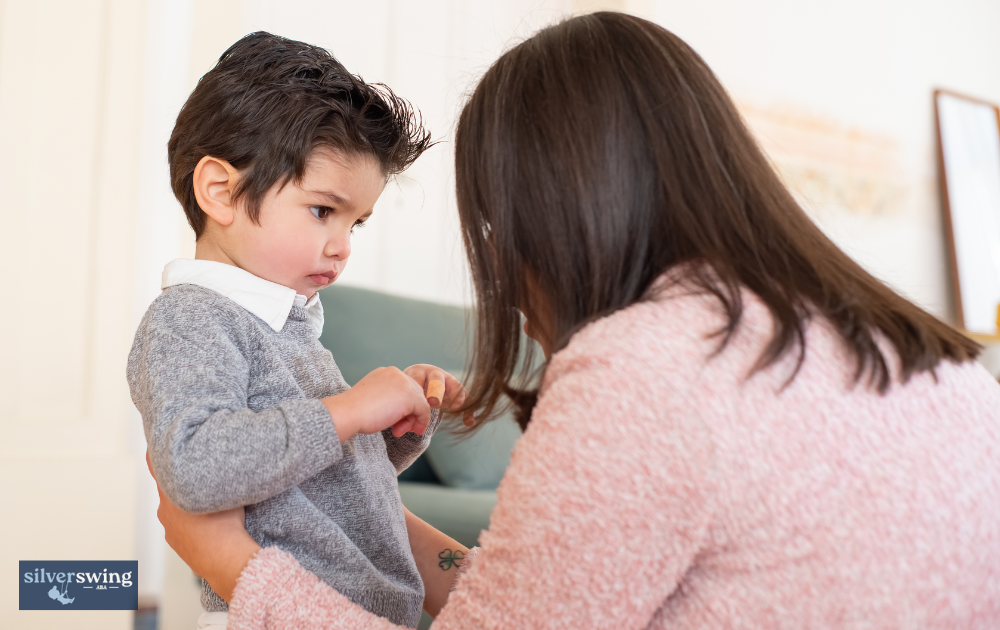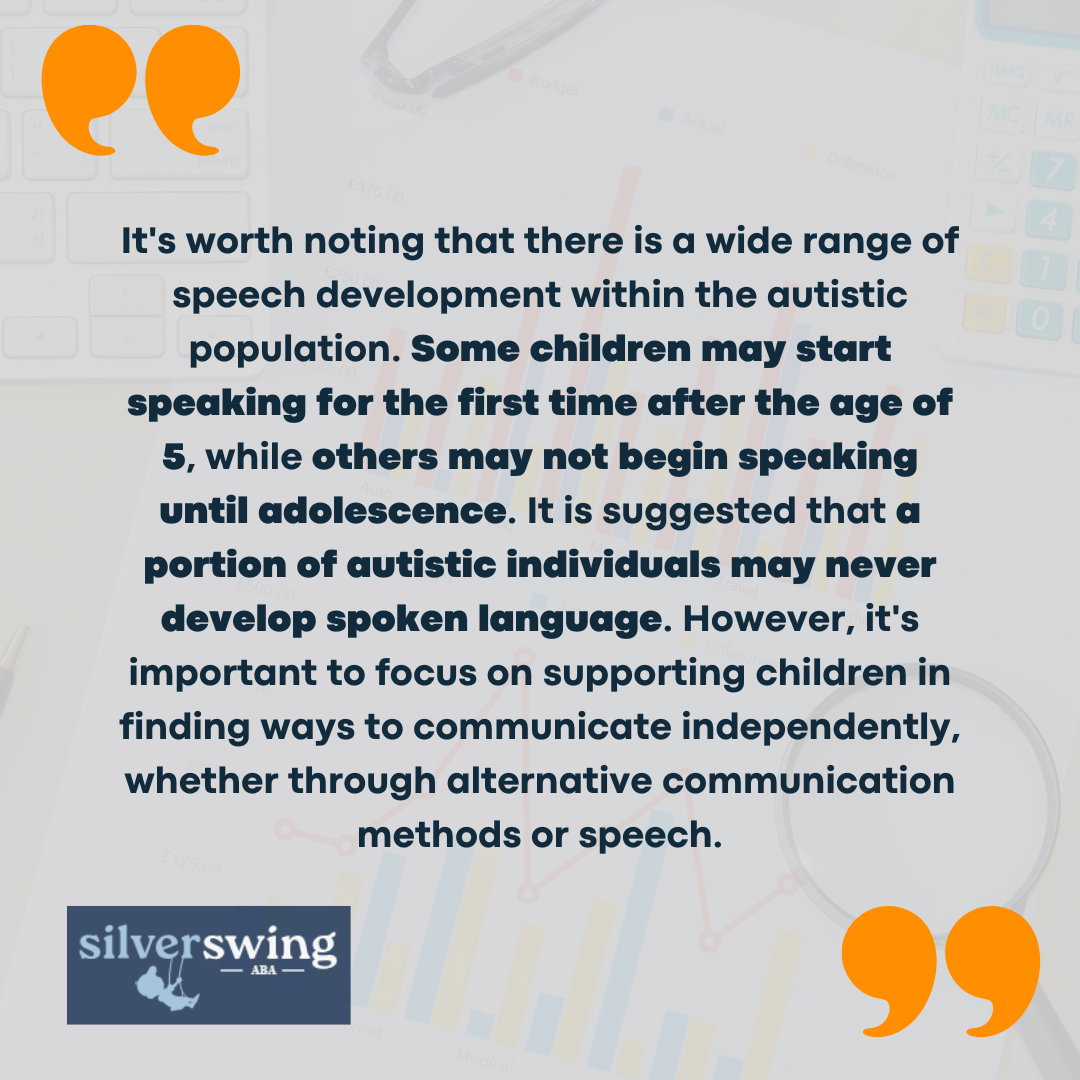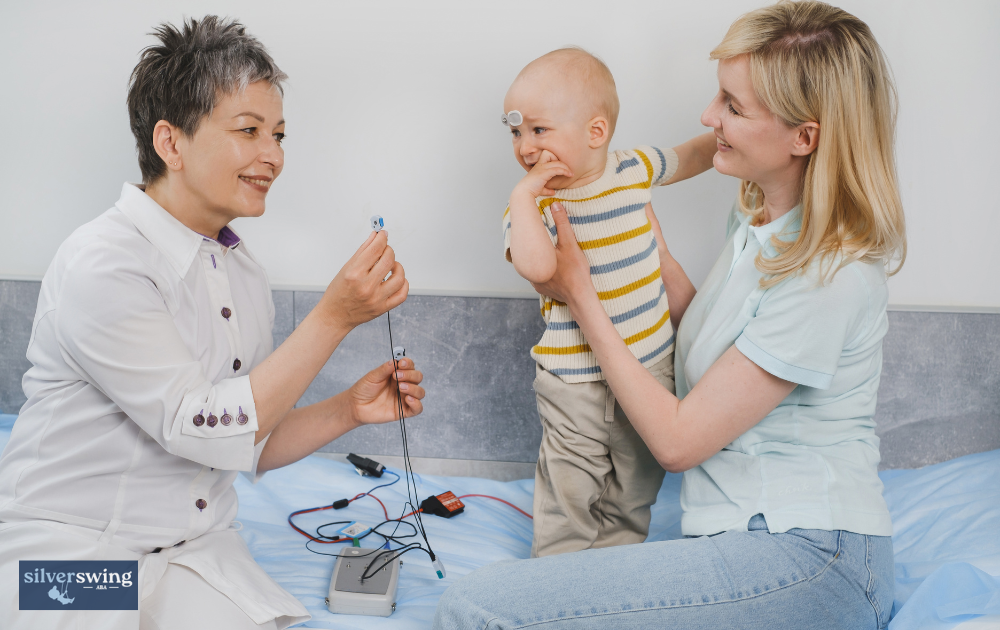For children who are developing across all areas and learning skills in the right order and at roughly the right age, talking typically starts at about 12-16 months of age.
However, it’s important to note that children with autism may start talking at this age, but most don’t begin speaking until later in life. Some autistic children may start talking between the ages of 2-3 years, while others may start even later or never develop speech.
This brings the question: When does an autistic child actually start talking?

Delayed Speech in Autism
Delayed speech development is a common characteristic among many autistic children. This delay can be attributed to missed early skills that are crucial for speech development. These skills include looking at people, observing their actions, and imitating them.
Typically, these behaviors start to develop in the first 6-12 months of life in children who are on track to begin talking.
It’s important to understand that the speech development path for autistic children may differ significantly from their neurotypical peers. While some autistic children may experience early or advanced speech, others may experience a speech delay. The variability in speech onset among autistic individuals highlights the unique nature of autism spectrum disorder.

To better understand the verbal abilities of autistic individuals, it is common to classify them as either verbal or non-verbal. Research generally suggests that individuals with 0-12 words are classified as non-verbal.
However, defining someone as non-verbal can be complex, as some individuals may have a limited number of words but still be considered non-verbal.

Factors Affecting Speech Development
There are several factors that can influence the onset and progression of talking among autistic children. Understanding these factors is essential for parents and caregivers to support and promote effective communication.
There are two significant factors to consider for this which are as follows:
Early Skills for Talking
For children with autism, talking development may be delayed due to missed early skills that are crucial for language acquisition. These early skills include looking at people, watching what people are doing, and imitating them. These behaviors should ideally begin to develop in the first 6-12 months of life for children to start talking.
By observing and imitating others, children learn the basic building blocks of language, such as sounds, words, and gestures. These early skills lay the foundation for later language development. However, in autistic children, these skills may be delayed or absent, which can contribute to speech delays.
Parents and caregivers can support the development of early skills for talking by providing a nurturing and stimulating environment. Engaging in activities that encourage eye contact, imitation, and social interaction can help foster these important skills. Early intervention programs that focus on promoting these skills can also be beneficial.

Early Intervention
Early intervention plays a vital role in supporting the speech development of autistic children. The earlier a child is diagnosed with autism, the sooner early intervention can begin, leading to better outcomes.
Early intervention should address the early skills that the child may be missing, such as reaching or pointing for things they want, responding to voices, watching others play with toys, and imitating actions in songs.
Interventions tailored to the specific needs of autistic children can help bridge the communication gap and facilitate the development of speech. Speech therapy, in particular, focuses on improving communication skills, including speech production, understanding language, and social interaction.
Early intervention strategies may involve a combination of individual therapy sessions, group activities, and home-based exercises. These interventions aim to enhance communication abilities, promote social interaction, and improve overall language skills.

Variability in Speech Onset
There is a wide range of variability in the onset of speech for speech development in autistic children. While some children with autism may utter their first words around the typical milestone ages of 12 to 18 months, others might not start talking until they are well into their preschool or elementary years.
This variability is due to the spectrum nature of autism and the individuality of each child’s development.
Age Range for First Words
The age at which an autistic child says their first words can vary significantly. While some children may begin to produce recognizable words around the age of 12 to 18 months, others may have delayed speech and start speaking later in childhood.
It’s important to note that this range is not exclusive to autistic children, as there is also variability in speech onset among typically developing children.
It’s crucial for parents and caregivers to remember that speech development is just one aspect of communication and that non-verbal forms of communication, such as gestures and eye contact, can also play a significant role in early communication.
Each child’s journey is unique, and it’s important to focus on their individual progress rather than comparing them to others.
Regression in Language
Another important aspect to consider is the phenomenon of language regression in some autistic children.
Regression refers to the loss of previously acquired language skills. Approximately 25-30% of children with autism experience this regression in language development. They may lose words they were previously able to say or show a decline in their overall ability to communicate effectively.
Language regression can be a challenging and concerning development for parents and caregivers. It often occurs between the ages of 18 to 24 months, but it can happen at any time during early childhood. The reasons for language regression in autism are not fully understood, and more research is needed to determine the underlying causes.
When a child experiences language regression, it’s important to seek professional guidance from speech-language pathologists and other specialists who can provide appropriate interventions and support.
Early intervention is key in helping children with autism regain and develop their communication skills.




